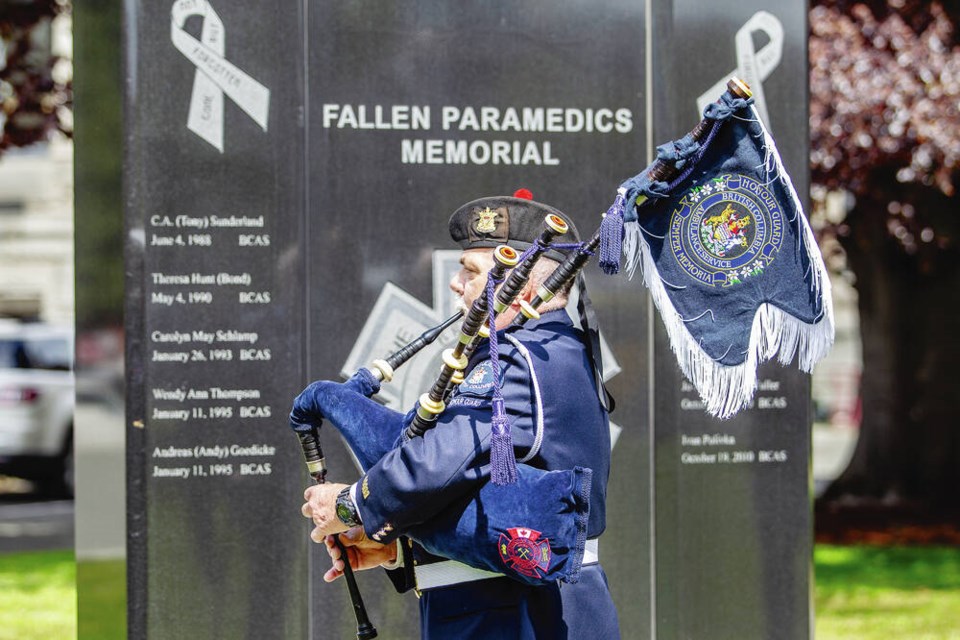Mike Wright has been in the homes of heart-attack victims and at the scenes of drug overdoses and gruesome car crashes in his 25 years as a paramedic with the B.C. Ambulance Service.
It all takes a huge personal toll for paramedics and dispatchers, Wright said Monday at a ceremony to honour paramedics in B.C. who have lost their lives in the line of duty.
“We see it all,” said the 64-year-old, a unit chief at Port Renfrew ambulance station.
Flowers and a wreath were laid by an honour guard at a large granite slab on the legislature grounds that is inscribed with the names of 10 paramedics who have died over the years.
Wright said many more of his colleagues carry the “scars and damage” of what they see on the job.
Years ago, while working out of the Mill Bay ambulance station, he saw too many horrific car crashes, he said. “And I got damaged. It wasn’t any one thing, it was a culmination over the years and it took its toll.”
But now there are mental-health supports for what the ambulance service calls “critical incident stress” for paramedics, who learn how to manage the traumas that can lead to anxiety, depression and substance abuse.
Counselling services and other resources are available for all members — often immediately after experiencing a disturbing call, said Wright.
The B.C. Ambulance Service has hired about 1,000 new employees since the pandemic wound down, and there’s been a massive shift from a part-time workforce to full-time in stations around the province.
Wright said the approach now is to get recruits’ “feet wet slowly” by giving them “experience shifts” as a third member of the crew in busier centres such as Victoria, Nanaimo and Duncan, rather than just starting them off in a remote station like Port Renfrew.
“They’re watching what is going on to get acclimatized,” he said. “That’s hugely important to me. The last thing I want to do is break somebody in the first six months.”
Wright said dispatch and supervisors are aware when crews attend a challenging call and before the employee even gets a chance to reach out, dispatchers, supervisors and unit chiefs are reaching out to them.
“It’s a very proactive approach,” said Wright. “It hadn’t even evolved when I started. Now the organization, we have come so far.”
Gretchen Bonegardener is part of the ambulance service’s critical incident stress team and has a support dog named Charlie, a three-year-old yellow Labrador she takes to stations to see paramedics recovering from physical and stress-related injuries.
“We’ve come leaps and bounds in the last eight years that I’ve been in the service,” said Bonegardener. “It’s been so huge to be able to talk about mental health and being able to say: ‘Hey, I’ve just had a rough experience and I’m not OK and I need some help.’
“It used to be ‘Oh you’re weak’ — now we realize that’s normal. That means you’re human. We’re moving in a really positive direction.”
Health Minister Adrian Dix noted Monday that a contract negotiated with the paramedics’ union last year included the switch from a largely casual workforce to 2,500 full-time positions and “significant supports.”
He said the province is continuing to look at adding supports for the service. The union representing the ambulance service started lobbying the province this week for funding for additional online counselling services.
“It isn’t just sometimes the terrible instances they face of people dying, but also the mental-health challenges that come from being a paramedic,” Dix said. “They do exceptional things and today is a day to remember that.”
Brad Mitchell, director of clinical operations for B.C. Emergency Health Services and an ambulance paramedic and dispatcher for more than 30 years, said supports that include family counselling are a “major new piece.”
“It’s hard to come home sometimes to your family who doesn’t understand what you’ve gone through. Years ago, you had to suffer that alone.”
>>> To comment on this article, write a letter to the editor: [email protected]




